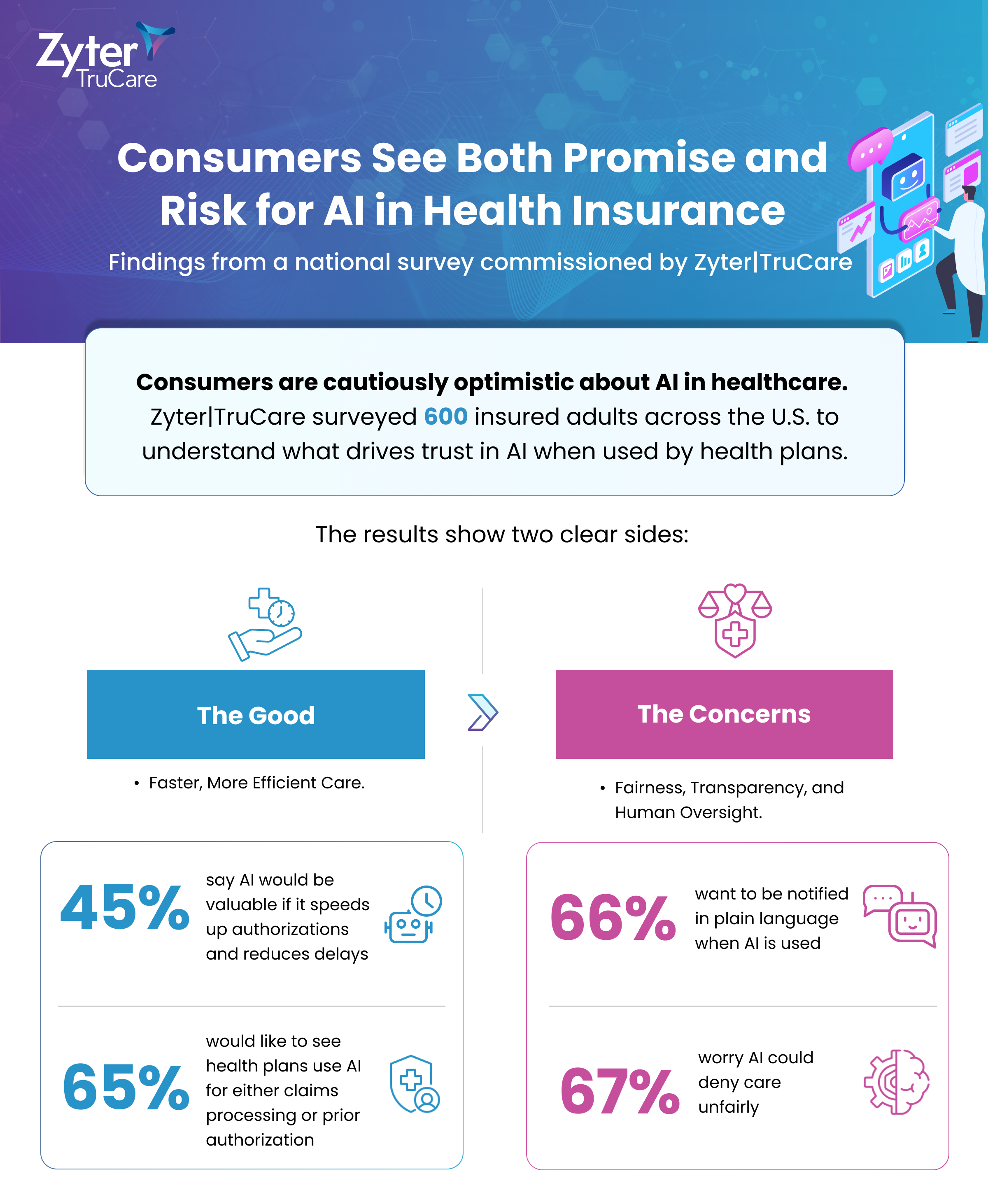Consumers Are Open to AI in Healthcare if Human-Guided & Transparent, New Zyter|TruCare Survey Reveals
Survey showcases consumer attitudes towards health plans’ use of AI
Rockville, Maryland, Oct. 30, 2025 (GLOBE NEWSWIRE) -- Consumers are cautiously optimistic about health insurers’ use of artificial intelligence (AI), with most saying they would support it if it leads to faster care decisions and maintains a strong human role, according to a new survey commissioned by Zyter|TruCare.
The national poll of 600 insured adults revealed that while 67% worry AI could unfairly deny care, nearly half say they would value AI if it helped accelerate authorizations and reduce treatment delays. Two-thirds want clear disclosure - written in plain language - whenever AI is used to review their care.
“Consumers aren’t rejecting AI, they’re asking for confidence and clarity,” said Sundar Subramanian, CEO of Zyter|TruCare. “They want assurance that the technology is being used to make their lives easier, without adding additional risk, and that a human is always making the final call.”
As health insurers turn to AI to improve efficiency, the survey highlights a growing need to bridge the communication gap between plans and members. “Too often, health plans focus on internal efficiency or provider engagement,” Subramanian added. “It’s time to engage consumers directly - showing them how AI can lead to faster, fairer, and more personalized care decisions.”

Key Findings
- 67% worry that AI could unfairly deny care
- 66% want to be clearly notified when AI is used in prior authorization reviews
- 45% say they would value AI if it speeds up authorizations and reduces delays
- 51% trust a human claims analyst more than an AI system today—but are open to change if transparency improves.
Building Confidence Through Human-Centered AI
Leading health plans already use AI to support, not replace, clinical and administrative teams. AI can help nurses review hundreds of pages of documentation in seconds, flag relevant information, and contact providers directly for clarifications or appeals, while the nurse (or for denials, a physician) retains ultimate decision authority.
A separate recent Zyter|TruCare study additionally showed that when clinicians understood how AI generated its recommendations and the reasoning behind them, their acceptance of AI-assisted decisions improved dramatically - from 13% to 67%.
“This is the path forward,” said Subramanian. “Trust isn’t built through algorithms alone - it’s earned through transparency, human judgment, and proven outcomes.”
Survey Methodology
Zyter|TruCare commissioned Pollfish to conduct an online survey of 600 U.S. adult health insurance members. All figures, unless otherwise stated, are from Pollfish. Fieldwork was undertaken between October 7 and 8, 2025. The survey meets rigorous quality standards and employs a non-probability-based sample using quotas upfront during collection and a weighting scheme on the back end designed and proven to provide nationally representative results.
About Zyter|TruCare
Zyter|TruCare is a leader in healthcare workflow modernization and population health technology. Its platform supports over 56 million covered lives across more than 50 health plans, delivering NCQA pre-certified, HITRUST-certified, and SOC-2 compliant solutions for care management, utilization review, and clinical operations. Its flagship product, Zyter Symphony™, a next-generation, orchestrated Agents-as-a-Service platform, manages a coordinated system of modular AI agents that automate full workflows, not just individual tasks. These agents free up clinical and administrative staff while accelerating speed to decision and action.
For more information about Zyter Symphony™, please visit: https://www.zyter.com/solutions/zyter-symphony.
Attachment

Michele Nachum Venture PR michele@venturepr.co Keilani Finley Zyter|TruCare keilani.finley@zyter.com
Legal Disclaimer:
EIN Presswire provides this news content "as is" without warranty of any kind. We do not accept any responsibility or liability for the accuracy, content, images, videos, licenses, completeness, legality, or reliability of the information contained in this article. If you have any complaints or copyright issues related to this article, kindly contact the author above.

